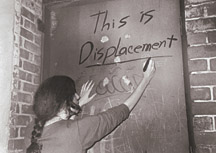In 1992, the New York Times called Delivered Vacant an “urban epic.” Now, the documentary about Hoboken’s painful gentrification in the 1980s will make an epic return this weekend.
The eight-year documentary by filmmaker Nora Jacobson shows the raucous council meetings and fires that occurred as Hoboken transformed from an immigrant-heavy industrial port to Wall Street’s bedroom community. The film’s title refers to the final step in the process of emptying out residential buildings and handing them over to a high-paying developer to be converted into condominiums. This is called delivering the building vacant, because it means the buyer does not have to worry about evicting tenants before converting the building to condos.
“I didn’t want the film to be this black-and-white condemnation of developers.” – Nora Jacobson
________
In the 1990s, the film premiered at the New York Film Festival, then at the Sundance Film Festival and the San Francisco International Film Festival, where it garnered a Golden Gate Award.
Projected Images of Hudson County will present the film on Saturday, Nov. 7, 7:30 p.m., at the Burchard Auditorium, Stevens Institute of Technology, Sixth Street and River Terrace, Hoboken.
Admission is $10; all proceeds will support Hoboken Movies Under the Stars for 2010.
For more information on the showing, call (201) 217-4077.
Fires, condos, and Yuppies influx
In the 1980s, several of Hoboken’s apartment buildings caught fire, and rumors spread that the fires were purposefully set to quickly oust tenants. Several lives were lost in the blazes.
The film features the travails of tenants, building owners, and local politicians like Mayor Steve Cappiello and then-City Councilman David Roberts. Roberts went on to become mayor from 2001 to 2009.
The displacement of longtime residents created citywide tension between “born-and-raised” Hobokenites and the influx of suited Manhattan-types that still exists today. These “young urban professionals,” or Yuppies, aroused the ire of the natives. The blue-collar-meets-white-collar clash had many shades of gray, though, including newcomers pushing for tenant rights and old timers looking to make a profit off of the condo spree.
The film delves into the inner workings of the politicians who were trusted by the natives but may have been complicit in the gentrification in order to find their share of the payout.
Banned in Hoboken?
The film has not been shown in Hoboken for years, according to Geri Fallo, cultural affairs coordinator for the city.
Many people believe it was kept off the screen locally because of a silent mandate by Roberts, who reportedly believes he was ill-portrayed in the documentary. Fallo would not comment on those rumors.
Fallo is also the founder of sponsor Projected Images of Hudson County, a non-profit organization that brings independent films to Hudson County.
In the past, Projected Images has shown screenings with filmmakers such as John Sayles, Kevin Smith, Todd Haynes, D.A. Pennebaker, Nancy Savoca, Jacobson, and others.
The screening of Delivered Vacant is co-sponsored by Stevens Institute of Technology and the Hudson County Division of Cultural and Heritage Affairs.
Filmmaker looks back
Jacobson, now a Vermont resident, shot the film over eight years beginning in 1984.
“Living in Hoboken, watching what was happening around me, people getting kicked out of their apartments,” she said, “I felt as a newcomer to Hoboken that I was part of the change that was happening, and indirectly one of the causes of what was happening.”
She added, “I didn’t want the film to be this black-and-white condemnation of developers. It really is a film that tries not to look at it from that point of view. Certainly, the people that were being burned out of their apartments, the people that were being kicked out of their home, those were the people that I wanted to show.”
Jacobson moved from Hoboken to Manhattan during the filming years, but later moved back to re-establish herself in the goings-on.
She never felt any personal danger while documenting the struggles, but one topic seemed too intense for close-up.
“I remember that I didn’t want to pursue the fires,” she recalls. “The fires were scary. There were rumors that they were set by arsonists. People were killed. Once there’s that threat – the possibility of death and possible criminal action – you have to think twice about it. It seemed [dangerous].”
She was also concerned with finding the final shot.
“I was thinking about how the film was going to end,” she said, “and an ending sort of appeared to me when there was the financial crisis and the condos that were made out of these people’s homes were sitting vacant, the supreme irony of that. After all of that fighting and struggle, here these apartments are sitting empty. It was sort of like a circle.”
Jacobson will be in town for the screening. Then, she will move to Brooklyn to spend a month editing footage for a new collaborative film about modern independence movements in Vermont.
Before shooting Delivered Vacant, Jacobson has only worked on a couple of short documentaries about things that were going on in Hoboken, “almost anthropological films,” she said.
Her background was as an experimental filmmaker, so, “I really had to teach myself a more conventional way of storytelling and editing.”
“It was my education as a filmmaker,” she said. “It was such an intense moment in so many of our lives. It meant everything to me. It was my life. I was totally consumed by it and with it. I wouldn’t have had it any other way.”
“I learned a lot about life too,” she added. “It was a pretty incredible experience; for that reason, it is probably the film that I love the most that I’ve made.”
She also has a feature script she hopes to shoot in Korea, about international adoption
After spending 15 years in Hoboken, she said she “misses it very much,” but loves the county just as much as the city. “I like the extremes,” she said.
Timothy J. Carroll may be reached at tcarroll@hudsonreporter.com.
